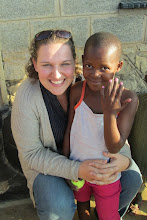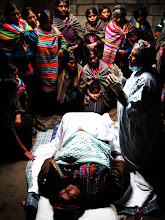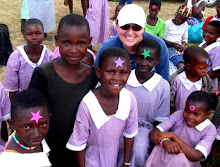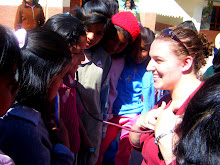I'm
six days away from saying goodbye to Ha Selomo... It's been a whirlwind few weeks, full of farewell moketes, tearful goodbyes, and beautiful gifts. I've cried more in the past week than throughout the entire length of my service.... I'm fine with the idea of leaving behind my friends and teachers, or even my Basotho family. It's my kids that make this difficult.
I feel like I talk and write about "my kids" all the time... Yet it's still difficult to describe to people back home in America why this is such a difficult goodbye for me. After all, I'm an Army Brat... I'm a bonafide expert at putting on the brave face, giving a hug, and never looking back. It's a skill I've been perfecting since infancy.
So you'd think that I'd have figured this out, right? You'd think this would be easier. It's not. It's heart breaking. Gut wrenching. The hardest goodbye I've ever had to say.
If you think that's slightly melodramatic or over-reactionary, let me try to show you why.
.................
Last Wednesday morning I walked into my Form B Math class bright and early, ready to revise solving equations. Nothing seemed amiss, until I looked towards the left hand corner of the classroom. In the corner, Mapaseka, sat with her head drawn down... But what caught my eye at first wasn't her, it was the absence of Thandiwe and Maretha, who normally sit on either side of her. I glanced across the sea of smiling faces, and quickly found them. Both had strangely squeezed themselves to fit into a wooden bench, with four other students. Mapaseka was alone.
Ten minutes into my class, I looked up- ready to call Panya, who had his hand darting into the air excitedly, up to the board to solve an equation- when something caught my eye. As Mapaseka looked across the aisle towards Panya and his distracting antics, the light from the broken window pane illuminated her face. Across the side of her cheek and forehead were two giant, bloody gashes. They horrifyingly left her scared from hair-line to lip. Her right eye was swollen shut in blue and yellow bruises that swelled the entire half of her face. Her lip was split open.
I struggled to hold back the tears I felt welling up, threatening to make me loose my composure in front of 48 students. Now I understood Mapaseka's forced isolation in the corner. Everyone willfully sought to ignore the difficult truth sitting in the corner of the classroom- the proverbial " pink elephant" in the room. No one wanted a reminder that it could just as easily have been their own father who pulled a knife on them to unleash his anger. It could happen to almost anyone at any time.
There was no police report or call to Child Protective Services that day. I pulled Mapaseka aside quietly after class to make sure she was alright. She is one of MY girls.... One of the 32 female students that I've so painstakingly attempted to empower and inspire in my Young Women's Group for the past year. I've taught them about self-esteem, goal setting, and taking ownership over your own body and health. That morning when I looked into her battered face, all that fragile and painstakingly constructed self-worth had vanished. I had no words- no amount of reading or talking about domestic violence prepares you for the moment you witness it on a child's face. The night before, she'd gone out to see a friend after dark- This was her father's idea of an appropriate response. She'll bear the scars of his fury and violence for a lifetime... But it's the destruction he's created beneath her battered face that I grieve for most. In 15 minutes, he stole from her everything that I'd tried to give her over the past two years.
.............
Before now, every goodbye I've ever said was done with the knowledge that those friends and family would go into the world and live healthy, happy, and fulfilled lives. I feel comforted knowing that even though my childhood or college friends aren't with me now, they are out in the world doing amazing things. They're happy. They're fulfilled. And most of the time, I get to watch and celebrate with them through Facebook and long distance phone calls as they bravely conquer the world. There's an incredible comfort in that- one I always took for granted until I was faced with saying goodbye to my kids in Lesotho.
There are no such false comforts or assurances to be found in this goodbye.
I'm going to walk away in six days.... I honestly don't know what will happen to my girls after I do. Children die here. And yes, I understand that children die everywhere, but it's hard to describe the magnitude of death in this country. This is a place where funeral homes are more common than gas stations. It overwhelms. I'd only been a teacher for 9 months when I had to attend my first funeral for one of my students. It was an experience that still haunts me. One day Teboho was sitting in the corner of my Form B Biology class, making too much noise with Lillo and Ketseketse. The next afternoon, he collapsed on the way home from school. By Monday morning, I was putting his funeral on my calendar. It's impossible to describe how deeply the experience of sitting at his memorial and funeral imprinted on me.
Safety, security, love, and happiness are not guarantees for my kids. My girls live in a culture where men are EXPECTED to beat their wives. It's not just tolerated, it's expected. IF he loves you, he WILL beat you. Some of my children go home to abusive parents, with no hope of government or civil protection. And that's if they are lucky enough to even have living parents, because in my school it's more common to be an orphan than to go home to a mom or dad. Earlier this month, a female student of one of my PCV friends was gang raped by two male students at her school. The girl was told to go back to school the next day and not talk about it- Now she sits in class next to her attackers. Another friend had one of her female students abducted and raped. She was forced to marry her attacker. Not everyone in the world gets an equal shot at a happy and healthy future. In the great lottery of life, it often feels like the deck is stacked against my kids.
So I get to say goodbye, with no assurances for their lives or that I'll ever be able to see or hear from them again. My kids don't have phones, no less Facebook or email addresses. There is a post office, but international mail is expensive and all mail to the village goes through a communal PO Box, so it's also unreliable. I will never get to see the outcome of my efforts.... I'll never have the satisfaction of watching them grow up and miraculously make it through a University degree. Or live long enough without HIV to actually watch their own children become teenagers.
This is a tough goodbye. So I'm telling them now. I don't want any regrets. I may never get another chance to impart some small hope or wisdom, or tell them how much they've changed MY life. So I've got a plan.... A "goodbye bucket list."
1- Write a personal letter everyone in Lesotho who has touched my life.
2- Write personal cards to ALL of my students... No small feat when your smallest class is 44!
3- Host a "Young Women's Group Celebration!" at my house! We're gonna dance, and dance, and DANCE!
4- Hire my friend, 'Me Moipone to cater lunch for the party, pay her well, and then spend all day cooking with her!
5- Spend a weekend visiting 'Me Malehlohonolo and my host family in Makola, Berea District.
6- Go to church one last time with my host mother, 'Me Malehlohonolo
7- Take Toka and Tsoanelo, my little brother and sister, into Maseru for lunch at KFC! Then, of course, bring some back for our 'Me and Nkhono (grandmother).
8- Take my little girls, Mookho, Nthatisi, Mantletse, and Lerato, into town for a "Girls Day Out!" Teach them how to mail a letter at the post office, and have a fun lunch, with ice cream, of course!
9- Give the girls packets with letters, envelopes, and stamps, so we can write to each other.
10- Write cards to all of my colleagues and friends, to thank them for being MY teachers for the past two years.
11-Thank the school board in Sesotho and in person for allowing me to be a part off their school and for sharing their children with me.
12- Thank Chief Moshoeshoe for welcoming me in the village of Ha Selomo.
13- Set Kabelo up to apply for University in America this winter!
14- Go out, one last time, to party with my amazing friends and colleagues! Woot-woot!
15- Write letters in Sesotho to my host mother, 'Me Malehlohnolo, and my host father, Ntate Bereng, to thank them for caring for me like a daughter, and being my family in Lesotho.
16- Say goodbye to all the staff and students at the school in my farewell speech.
17- Give all my friends, students, colleagues, and neighbors my contact information in America.
18- Gve each of my little kids in village a picture of me and them to keep.
19- Give my Me Malehlohonolo and Ntate Bereng framed photos of me and them.
20- Give my Principal a framed photo of the Staff at Linokong High School.
21- Make sure my cat, Piña, has a good home in Lesotho.
22- Write thank you cards to all the Peace Corps staff.
23- Have a special day-out with my best friend, Makabelo. Leave her with airtime so we can make long-distance phone calls over the next few months.
24- Take Makabelo's kids- Kabelo, Tumisang, and Lilly- out for a special day. Ride the new ferris wheel at Maseru Mall and have a fun lunch in town!
25- Give hugs, and say "I love you" and " I'll miss you" to the people who've changed my life.
With love from Lesotho.... Mary E.






















